(完整)初中英语语法专项形容词
- 格式:doc
- 大小:27.01 KB
- 文档页数:3
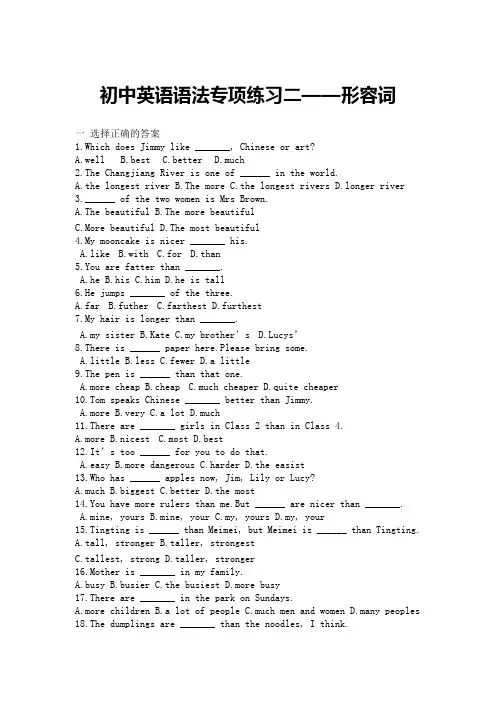
初中英语语法专项练习二——形容词一选择正确的答案1.Which does Jimmy like _______, Chinese or art?A.wellB.bestC.betterD.much2.The Changjiang River is one of ______ in the world.A.the longest riverB.The moreC.the longest riversD.longer river3.______ of the two women is Mrs Brown.A.The beautifulB.The more beautifulC.More beautifulD.The most beautiful4.My mooncake is nicer _______ his.A.likeB.withC.forD.than5.You are fatter than _______.A.heB.hisC.himD.he is tall6.He jumps _______ of the three.A.farB.futherC.farthestD.furthest7.My hair is longer than _______.A.my sisterB.KateC.my brother’sD.Lucys’8.There is ______ paper here.Please bring some.A.littleB.lessC.fewerD.a little9.The pen is ______ than that one.A.more cheapB.cheapC.much cheaperD.quite cheaper10.Tom speaks Chinese _______ better than Jimmy.A.moreB.veryC.a lotD.much11.There are _______ girls in Class 2 than in Class 4.A.moreB.nicestC.mostD.best12.It’s too ______ for you to do that.A.easyB.more dangerousC.harderD.the easist13.Who has ______ apples now, Jim, Lily or Lucy?A.muchB.biggestC.betterD.the most14.You have more rulers than me.But ______ are nicer than _______.A.mine, yoursB.mine, yourC.my, yoursD.my, your15.Tingting is ______ than Meimei, but Meimei is ______ than Tingting.A.tall, strongerB.taller, strongestC.tallest, strongD.taller, stronger16.Mother is _______ in my family.A.busyB.busierC.the busiestD.more busy17.There are _______ in the park on Sundays.A.more childrenB.a lot of peopleC.much men and womenD.many peoples18.The dumplings are _______ than the noodles, I think.A.more nicerB.much deliciousC.very niceD.much more delicious19.She is _______ than me at drawing.A.betterB.bestC.goodD.harder20.This blue sweater is too big for me.Will you please show me a ______ one?A.smallB.smallerC.the smallestD.smallest二. 用所给词的适当形式填空1.Your classroom is _______ (wide) and _______ (bright) than ours.2.There are _______ hours of sunlight a day in winter than in summer.(few)3.Which do you like _______, maths or chemistry?(well)4.This is the ______ film I have ever seen.(good)5.Africa is the second _______ continent.(large)6.What he said made his mother much ______.(angry)7.I’m not as _______ as he.(careful)8.We’ve got as _______ books as we need.(many)9.They have done _______ (much) work with ______ (little) money.10.Practice as ______ as you can.(much)11.You’re the ______ person I’ve ever seen.(kind)12.He is _____ than his two sisters.(young)13.The ______ (old) I get, the ______ (strong) I seem to feel.14.The weather is getting ______ (warm) and ______ (warm).15.You are far ______ than you were.(polite)16.The patient is no ______ than people.(well)17.Summer is ______ season of the year.(hot)18.I can do it well with even ______ money.(little)三. 中考真题测试1.The air in Beijing is getting much ______ now than a few years ago.(2005年北京)A.cleanB.cleanerC.cleanestD.the cleanest2.My cousin has changed a lot.She used to be ______ but now she is tall.A.shortB.thinC.prettyD.heavy3.Mobile phones are very popular now and they are ______ than before.(2005北京海淀)A.cheapB.cheaperC.cheapestD.the cheapest4.—We spent all our money because we stayed at the most expensive hotel in town.—Why didn’t you stay at _____ one?A.a cheapB.a cheaperC.the cheapD.the cheaper5.—Do you like western food?— No.The food of our country is ______ that of western countries.(2005年广州)A.rather good thanB.much better thanC.more better thanD.not so good as6.This is _____ that all of us believe it’s very important.(2005年广州)A.such useful informationB.so useful an informationC.so useful informationD.such a useful information7.— Mum, could I have an MP3— Certainly, we can buy _____ one, but as good as this.(2005年沈阳)A.a cheapB.a cheapestC.a cheaperD.the cheapest8.The harder we work, the ______ result we will get.(2005年大连)A.fasterB.fewerC.betterD.the cheapest9.We should keep our eyes ______ while doing eye exercises.A.closeB.closedC.openD.opened10.Look at the man in the right picture.He is ______.(2005年吉林)A.right-handedB.left-handedC.no handD.a hand11.— Tom is good at drawing.How about Mike?— Mike is ______, I think.He has got more prizes than Tom.A.wellB.OKC.goodD.better12.— Have you bought that digital camera?— No, I can’t afford it.The price is a bit ______.(2005年河南)A.nowB.highC.cheap expensive13.Now more and more Chinese people are ______ enough to buy cars.A.richB.weakC.poorD.strong14.Kate is really ______.She’s never angry with others.(2005年安徽)A.tallB.friendlyC.luckyD.clever15.—Which is ______ river in China? (2005年武汉)— The Changjiang River.A.longerB.the longestC.longestD.the longer初中英语语法专项练习三——代词单项填空: 人称代词、物主代词、反身代词、指示代词和疑问代词1.____ is she? She's a nurse.A.WhoB.WhereC.WhichD.What2.____ is Tom like? Oh, he's short.A.WhichB.WhoC.WhatD.Whom3.____ cap is that?A.Who'sB.WhoC.WhoseD.Where4.____ is no use telling him about that.A.ThisB.ThatC.TheseD.It5.The three men, Bob, Joe and ____ met at the station.A.IB.meC.herD.you6.____ have been to Paris.A.I, you and heB.He, you and IC.You, he and ID.You, he and me7.My brother is so young that he can't take care of ____ .A.himB.herselfC.himselfD.his8.The young teacher teaches ____ politics.B.ourC.oursD.ourself9.Our work is not so good as ____ .A.himB.heC.hisD.he's10.Has Jack got the money? Yes, I gave ____ yesterday.A .to him them B.to him if C.him them D.it to him11.How hard ____ works!A.we B .him C.he D.his12.Won't you let ____ help you?A.I and my friendB.my friend and IC.my friend and meD.my friend and I to13.He asked the three men, Bob, Joe and ____ to be ready.A.IB.himselfC.meD.herself14.All my classmates are going to the Summer Palace except ____ .A.he and IB.he and meC.him and ID.him and me15.Go ____ to ____!A.here, usB.there, theyC.there, themD.here, we16.The moon is shining brightly tonight .____ is like a round plate.A.ItsB.HeC.SheD.They17.He is as tall as ____ .A.sheB.herC.himD.himself18.If I were ____ , I would take the advice.A.sheB.herC.heD.his19.Open the door.please? It's ____ .A.IB.myC.mineD.me20.She hasn't brought ____ book with her.Will you lend her ____?A.hers, yourB.her, yourC.hers, yoursD.her, yours21.That's not ____ ; it is ____.I made it ____.A.yours, mine, myselfB.your, mine, myselfC.yours, her, myselfD.yours, my, myself22.John's book is more interesting than ____ .A.your bookB.your oneC.yourselfD.yours23.Either Mary or her parents will let me use ____ car.A.herB.theirC.mineD.him24.The bird builds ____ nest in the tree.A.herB.it'sC.itsD.her's25.The sun makes ____ day and night.A.itsB.weC.ourD.ours.26.─I've forgotten my bread.─Never mind, you can have ____ .A.some of us someC.some of oursD.some of our27.Two sisters of ____ help us with our English.A.himB.hisC.heD.he's28.Are they friends ____ ?A.of youB.to youC.to yoursD.of yours29.Lily and Bill want to see it ____ .A.theirselvesB.themselvesC.himselfD.themself30.We had better ask the secretary ____ .A.hisB.himC.himselfD.themselves31.We met his grandma ____ .A.himselfB.hersC.herselfD.her32.The girl dresses ____ when she gets up.A.herB.sheC.herselfD.himself33.Please help ____ to some tea.A.meB.himC.yourselfD.yours34.Tom is not quite ____ today.A.hisselfB.himC.hisD.himself35.I'll bring ____ dictionary with me.A.myselfB.ourselvesC.my ownD.own36.____ magazine is over there.A.TheseB.ThoseC.ThisD.That37.____ a good idea.A.This isB.That's38.He was ill.____ is why he didn't attend the meeting.A.ThisB.ItC.ThereD.That39.What I want to tell you is ____ : The meeting is put off till Friday.A.itB.thisC.thatD.its40.She went to swim and I'll do ____ .A.suchB.sameC.the same asD.the same41.Our feeling was ____ .A.the same as theyB.same as theirsC.same as theyD.the same as theirs42.They left for Shanghai on ____ day.A.the sameB.such43.You can do it now or leave it till later, it is ____ to me.A.the sameB.all the same44.Who is that boy ? ____ .A.He is a studentB.He is a workerC.He is my brotherD.He is tall45.It was ____ warm day that they went swimming.A.suchB.such aC.soD.so a46.It was ____ a long time ago.A.suchB.very47.____ is he? He is a bus driver.A.WhoB.WhichC.ThatD.What48.How is your brother ? ____ .A.That's heB.That's himC.He's very goodD.He's very well49.____ these girls do you know?A.Which ofB.Who areC.WhatD.How many50.____ paper do you read? I read " China Daily ".A.WhichB.HowC.How manyD.What51.____ is the quickest way from here to the Bank?A.WhatB.WhichC.What wayD.Which the way52.What' s his name ? ____.A.It JohnB.John it's the nameC.It's JohnD.Its John53.What colour are your new shoes ? ____ .A.They are brown colourB.It's brownC.They are brownD.They are colour brown54.____ hat is that?A.Who'sB.WhoseC.WhoD.Whom55.The TV sets made in Shanghai are much better than ____ made in Beijing.A.thatB.theseC.thoseD.it初中英语语法专项练习七——副词1( ) 1 He speaks English___his aunt.A.as good asB.as well asC.as better asD.as best as( ) 2.Which do you like_____, skating, swimming or fishing?A.moreB.mostC.betterD.best( ) 3 Who sings___, Rose or Kate?A.wellB.goodC.betterD.best( ) 4 She writes____than I.A.more carefulB.much carefulC.much more carefullyD.much carefully( ) 5 The night was very ___, so he had to take off his shoes ___.A.quiet; quietlyB.quite; quicklyte; quickD.quite; quietly( ) 6 How ___ the girls are playing!A.happyB.happierC.happy lyD.happily2( ) 1 ____ he drops in ___ his friends after supper.A.Some times; forB.Sometimes; onC.Often; forD.Seldom; on( ) 2 In Britain tea ___ with milk or sugar in it.ually drinksB.is usually drunkually is drunkD.drank usually ( ) 3 He____ to school to clean his classroom.A.always comes earlyes always earlyC.always early comese always earlier3( ) 1 Better___than never.teB.the laterterD.the late( ) 2 We have been to the China Folk Culture Villages ____.telytetestst( ) 3 I got up____today.terB.more latelytelyte4( ) 1 Today Tom goes to school earlier than___.A.as usualualuallyD.ago( ) 2 Today we do our homework at home ___.A.than usualB.oftenuallyD.as usual( ) 3 Alice___goes to school at seven.ualuallyC.hardD.a little5( ) 1 It was___ bad weather that we all had to stay inside.A.veryB.soC.ratherD.such( ) 2 He is___ kind an old man that all the children like him.A.veryB.soC.ratherD.such( ) 3 He, our headmaster was___ pleased with our work.A.fairlyB.evenC.muchD.great( ) 4 There was a heavy snow last night.This morning is____ outside.A.too rather coldB.rather too coldC.such coldD.fairly cold6( ) 1 We won't go to the cinema next Saturday.They won't____.A.tooB.alsoC.neitherD.either( ) 2 She likes reading and___.A.so I doB.I do soC.I like soD.so do I( ) 3 -I won't go to the Great Wall tomorrow.-I won't, ___.A.neitherB.eitherC.tooD.also( ) 4 He likes to do some reading in the morning, I like it, ___.A.tooB.eitherC.neitherD.also( ) 5 He didn't know her address, ____ did I.A.tooB.alsoC.eitherD.neither7( ) 1 I have never seen ___ big pears.A.suchB.veryC.soD.rather( ) 2 He is ___ tired that he can't go any farther.A.soB.such -C.veryD.too( ) 3 That maths problem is ___ difficult ___ nobody can work it out.A.too; toB.very; thatC.so; thatD.very; but( ) 4 He is , teacher that all of us like him.A.such good aB.a so goodC.so good aD.a such good( ) 5 Jack doesn't work ____ Tom.A.as so goodB.so good asC.so hard asD.so harder as8( ) 1 I did my homework hours _____.A.beforeterC.agote( ) 2 I saw the film two days ___.A.agoB.beforeC.afterte( )3 I seem to have met you___.A.beforeB.agoC.yetD.some time9( )1 He got back____at four.A.to homeB.at homeC.his homeD.home( ) 2 Come____ quickly.I have something interesting to tell you.A.to hereB.up to hereC.hereD.into here( ) 3 These two young men stood ___ watching the train moving away.A.by thereB.from thereC.thereD.to there10( ) 1 Mother said, "Tom, you're seventeen, ____a child."A.no againB.not longerC.not moreD.no longer( ) 2 "Don't do that___." the teacher said to Tom.A.no moreB.no longerC.any moreD.some more( ) 3 I don't want to talk with you____.A.yesterdayB.no longerC.any longerD.some longer( ) 4 They have moved away from Beijing.They don't live there____.A.any longerB.once moreC.eitherD.again11( ) 1 My aunt will come back from Beijing ____.A.before longB.long beforeC.after longD.long after( ) 2 She read the book___.And I'll read it___.A.long before; long beforeB.before long; before longC.before long; long beforeD.long before; before long12( ) 1 When you do eye-exercise, you must keep your eyes____.A.closeB.closesC.closingD.closed( ) 2 It's a windy day.You'd better____ the windows.A.closeB.closedC.closingD.to close( ) 3 Bruce often ___ his left hand ___.A.keep; closeB.keeps; closedC.keep; closedD.keeps; close ( ) 4 It is very hot.Please keep the door .A.openB.openingC.opensD.opened13( ) 1 The boat is left ___ by the bank of the river.A.alongB.aloneC.longD.lonely( ) 2 He has a rest___ at home, watching TV.A.aloneB.oneC.alongD.lonely( ) 3 They went out for a walk___ the lake.A.aloneB.alongC.lonelyD.at( ) 4 The wall is two metres____.A.highlyB.widelyC.longD.along( ) 5 There is a___ island.On it there are many wild beautiful flowers.A.lonelyB.alongC./D.alone14( ) 1 The city is___ than the town away from the river.A.farB.fartherC.so farD.much far( ) 2 Do you need ___ explanation to the question?A.more farB.any furtherC.fartherD.any farA.( ) 3 I am so tired that I can't walk____.much far B.any farther C.even far D.very further初中英语语法专项练习八——介词一. 选择填空:1.Mrs.Brown came to China ____ 1996.A. fromB. ofC. toD. in2.The room was full ____ smoke after the big fire.A. ofB. withC. inD. for3. Here are some presents ____ you ____ our best wishes.A. to; withB. for; withC. of; aboutD. for; for4. Both Mr Green and Mrs Green were born ____ June, 1956.A. inB. atC. onD. for5.The little boy is always interested ____ science.A. withB. byC. inD. at6. Li Lei often gets up ____ seven o'clock on Sundays.A. onB. inC. atD. for7. They arrived early ____ a Tuesday morning.A. onB. atC. inD. of8.Macao(澳门)will return to our motherland ____ December 20th, 1999.A. onB. atC. inD. for9.----When were you born? ----I was born ____ August 25, 1983.A. onB. inC. atD. to10. Let me show you the place ____ the map.A. withB. onC. in11. John knows ____ a computer.A. how to useB. how useC. how uses12. The visitors ____ Japan arrived ____ Beijing Station last Tuesday morning.A. from; atB. of; toC. from; toD. of; on13. The teacher will be back ____ an hour.A. inB. afterC. on14. This programme was sent to the USA ____ China ____ satellite.A. in; ofB. of; inC. from; byD. by; from15. It's cold outside.Please your warm clothes.A.put inB.take offC.put onD.put up16. He got many gifts his birthday his friends.A.on, fromB.in, ofC.at, toD.from, for17. The classroom is quite different that one.A.ofB.fromC.withD.like18. Look, you'll see a bridge the river.A.onB.aboveC.overD.in19. –Your coat looks nice, Is It cotton? -Yes.It's Shanghai.A.made of, made byB.made of, made inC.made for, made inD.made from made by20. Tow may fall the others because he has missed so many lessons.A.afterB.behindterD.out of二、用适当的介词填空1. What's wrong ____ your watch?2. One ____ the students is in the classroom.3. I think the shop is closed ____ this time of day.4. My father teaches English ____ a school.5.We have lunch ____ the middle of the day.6. You can buy some school things ____ your way home.7. I was born ____ July 1, 1982.8. May I borrow a pencil ____ you?9.Don't sleep ____ the open air.10. I often help my mother ____ _ the housework.11. It's time ____ school.12. I have quite a lot ____ homework to do.13. What's the time? It's half ____ seven.14. Ducks are good ____ swimming.15. What are you talking ____ ?16.He is sitting ____ the front of the car.17. The eraser was passed ____ one student ____ another.18. Did you live ____ Beijing in 1997?19. When did you arrive ____ the village?20. I think Mary is ____ duty today.21.Eating too much isn't good ____ your health.22. I'm afraid he is ____ the cinema ____ the moment.23. Thanks ____ asking me to your party.24. My watch is very different ____ yours.25. What's the weather ____ today?26. The student is asking his teacher ____ the sports meeting.27. The farmers are all getting ready ____ the next year.28. The radio says the wind will stop later ____ the day.29. Let's go out ____ a walk, shall we?30.Tom, your mother is waiting ____ you.31. We have noodles for lunch for lunch ____ times.32. Harerbin is ____ the north of China.33. The day ____ tomorrow will be windy.34.Don't worry ____ your test.35. I don't know which is the way ____ the park.36.An old woman is ____ the side of the road.37. ____ the end of the road you'll see the hospital38. He left Tokyo ____ a visit ____ Beijing.39. Don't laugh ____ other people's mistakes.40. He did this instead ____ me.41.The people here are very friendly ____ us.42. Does he learn English ____ himself?43. I felt a little afraid ____ my teacher.44.I'm afraid he'll fall ____ the bike.45. Help yourselves ____ some fish, Lily and Lucy.46. ____ these words he left the classroom.47. It was a pleasure ____ me.48.I'm sorry I'm late ____ the meeting.49. Study hard, or you won't catch up ____ your classmates.50. Not far ____ him was Lin Tao. Lin Tao ran fast, too.51. Mr Wu is going to tell us the result ____ once.52.He goes to school early ____ usual.53. It's another way ____ saying fast.54.I'm sorry he doesn't agree ____ me.55. He prefers playing football ____ playing basketball.56. What do you mean ____ baozhi?57. Don't play ____ fire. It's dangerous.58. He didn't go ____ bed until twelve o'clock.59. My teacher was angry ____ me.60. Someone is knocking ____ the door.61. Have you heard ____ Jim yet?62.If you break the window, you'll have to pay ____ it.63. I'm sorry. I won't talk to others in class ____ now on.64. What have you done ____ the milk?65. The students walked ____ the gates with Uncle Wang.66. Are you ____ trouble, Jim?67.My mother is ill.I have to send ____ the doctor.68. The doctor operated ____ my mother at once.69. The glass is full ____ milk.70. I saw him ____ the crowd.71.There are a group of sheep ____ the foot of the hill.72. We are twins. People often mistake us ____ each other.73. The knife is made ____ metal and wood.74. Ships can travel ____ the world.75. He watched me ____ surprise.76. Choose my subject. Something about English, ____ example.77. Tie the horse ____ the tree.78.Nothing can stop us ____ studying hard.79. ____ Mr Wang's help, I have passed the exam.80. Please cut the metal ____ some pieces.81.I feel ____ going for a walk.82. We can finish the work ____ a week.83. Are you interested ____ the film Titanic? 84.Hundreds ____ years ago, there was a village here.85. What ____ earth can you see?86. When did you join us ____ the game?。
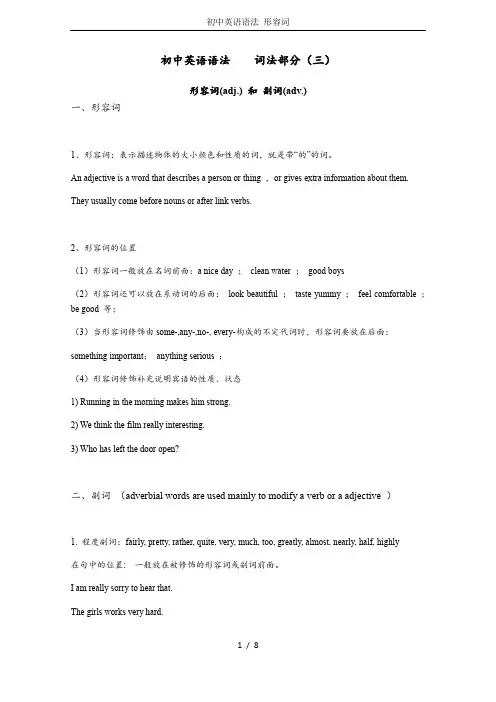
初中英语语法词法部分(三)形容词(adj.) 和副词(adv.)一、形容词1、形容词:表示描述物体的大小颜色和性质的词,就是带“的”的词。
An adjective is a word that describes a person or thing ,or gives extra information about them. They usually come before nouns or after link verbs.2、形容词的位置(1)形容词一般放在名词前面:a nice day ;clean water ;good boys(2)形容词还可以放在系动词的后面:look beautiful ;taste yummy ;feel comfortable ;be good 等;(3)当形容词修饰由some-,any-,no-, every-构成的不定代词时,形容词要放在后面:something important;anything serious ;(4)形容词修饰补充说明宾语的性质、状态1) Running in the morning makes him strong.2) We think the film really interesting.3) Who has left the door open?二、副词(adverbial words are used mainly to modify a verb or a adjective )1. 程度副词:fairly, pretty, rather, quite, very, much, too, greatly, almost, nearly, half, highly在句中的位置: 一般放在被修饰的形容词或副词前面。
I am really sorry to hear that.The girls works very hard.The weather here is quite different from that in Nanjing.2. 时间副词:now, then, soon, ago, recently, lately, later, before, early, today, tomorrow, yesterday, tonight, suddenly, immediately, still, already, just等在句中的位置: 通常位于句末。
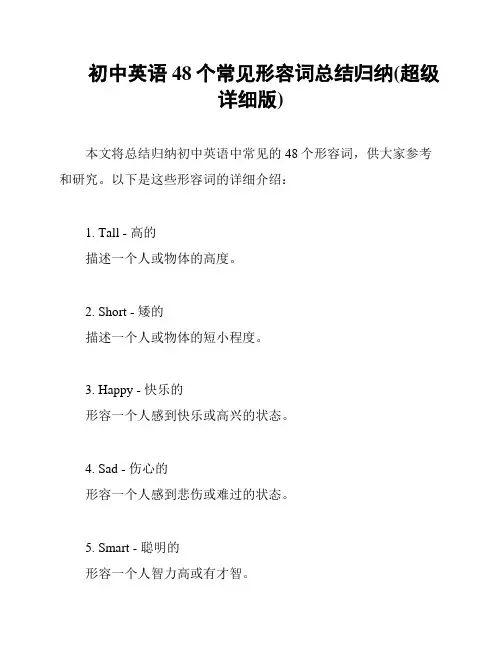
初中英语48个常见形容词总结归纳(超级详细版)本文将总结归纳初中英语中常见的48个形容词,供大家参考和研究。
以下是这些形容词的详细介绍:1. Tall - 高的描述一个人或物体的高度。
2. Short - 矮的描述一个人或物体的短小程度。
3. Happy - 快乐的形容一个人感到快乐或高兴的状态。
4. Sad - 伤心的形容一个人感到悲伤或难过的状态。
5. Smart - 聪明的形容一个人智力高或有才智。
6. Stupid - 笨的形容一个人智力低或愚笨。
7. Beautiful - 美丽的形容一个人或物体外貌美丽。
8. Ugly - 丑陋的形容一个人或物体外貌丑陋或不好看。
9. Strong - 强壮的形容一个人的体力或力量强大。
10. Weak - 虚弱的形容一个人的体力或力量虚弱。
11. Brave - 勇敢的形容一个人有勇气或无畏。
12. Cowardly - 胆小的形容一个人胆小或懦弱。
13. Friendly - 友好的形容一个人待人友好或易于交往。
14. Hostile - 敌对的形容一个人对他人怀有敌意或不友好。
15. Honest - 诚实的形容一个人做事讲实话或守信用。
16. Dishonest - 不诚实的形容一个人不讲实话或不守信用。
17. Generous - 慷慨的形容一个人乐于助人或大方。
18. Stingy - 吝啬的形容一个人不愿意给予或小气。
19. Agressive - 进攻性的形容一个人具有进攻性或攻击性。
20. Passive - 被动的形容一个人缺乏主动性或消极。
21. Energetic - 精力充沛的形容一个人精力旺盛或充满活力。
22. Tired - 疲劳的形容一个人感觉疲倦或无精神状态。
23. Clever - 聪明的形容一个人机智或灵活。
24. Clumsy - 笨拙的形容一个人动作不灵活或不熟练。
25. Interesting - 有趣的形容一个人或事物有趣或引人入胜。
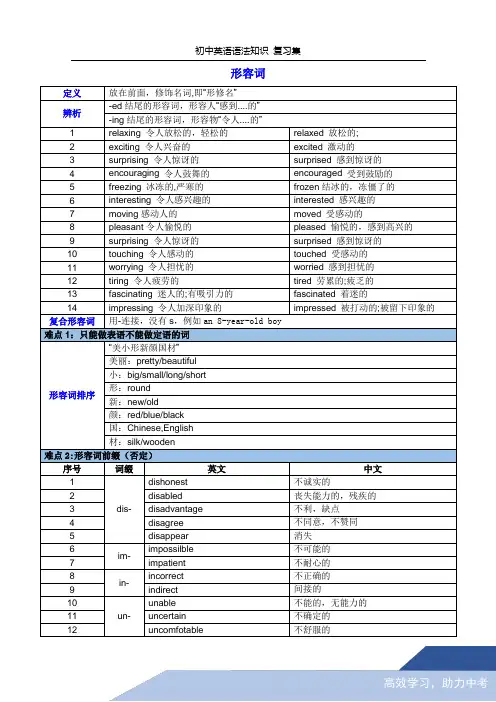
形容词定义放在前面,修饰名词,即“形修名”辨析-ed结尾的形容词,形容人“感到....的”-ing结尾的形容词,形容物“令人....的”1 relaxing 令人放松的,轻松的relaxed 放松的;2 exciting 令人兴奋的excited 激动的3 surprising 令人惊讶的surprised 感到惊讶的4 encouraging 令人鼓舞的encouraged 受到鼓励的5 freezing 冰冻的,严寒的frozen结冰的,冻僵了的6 interesting 令人感兴趣的interested 感兴趣的7 moving感动人的moved 受感动的8 pleasant令人愉悦的pleased 愉悦的,感到高兴的9 surprising 令人惊讶的surprised 感到惊讶的10 touching 令人感动的touched 受感动的11 worrying 令人担忧的worried 感到担忧的12 tiring 令人疲劳的tired 劳累的;疲乏的13 fascinating 迷人的;有吸引力的fascinated 着迷的14 impressing 令人加深印象的impressed 被打动的;被留下印象的复合形容词用-连接,没有s,例如an 8-year-old boy难点1:只能做表语不能做定语的词形容词排序“美小形新颜国材”美丽:pretty/beautiful 小:big/small/long/short 形:round新:new/old颜:red/blue/black国:Chinese,English 材:silk/wooden难点2:形容词前缀(否定)序号词缀英文中文1dis- dishonest 不诚实的2 disabled 丧失能力的,残疾的3 disadvantage 不利,缺点4 disagree 不同意,不赞同5 disappear 消失6im- impossilble 不可能的7 impatient 不耐心的8in- incorrect 不正确的9 indirect 间接的10un- unable 不能的,无能力的11 uncertain 不确定的12 uncomfotable 不舒服的13 unknown 未知的;不出名的14 unlucky 不幸运的15 unsure 不确定的16 unusual 不同寻常的17 ir- irregular 不规律的难点3:形容词后缀序号词缀英文中文1able comfortable 舒适的2 enjoyable 令人愉快的3 suitable 适当的,合适的4 valuable 有价值的5al musical 音乐的6 in ternational国际的7 national 国家的8 natural 自然的9 personal 个人的10 practical 实际的,实用的11 traditional 传统的12tive active 积极的,主动的13 attractive 吸引人的14 creative 创造性的15 expensive 昂贵的16 productive 多产的,富有成效的17ful beautiful 美丽的18 careful 小心的,仔细的19 cheerful 愉快的20 colourful 多彩的21 forgetful 健忘的22 harmful 有害的23 helpful 有益的24 hopeful 怀有希望的25 meaningful 意味深长的26 successful 成功的27 useful 有用的28less careless 粗心的29 endless 无尽的30 helpless 无助的31 harmless 无害的32 homeless 无家(可归)的33 meaningless 无意义的34 sleepless 失眠的35 useless 无用的36 ous dangerous 危险的37 delicious 美味的38 famous 著名的 39 humorous 幽默的40 serious 严肃的,认真的 41 ycloudy 多云的,阴天的 42 foggy 有雾的43 funny 有趣的,好笑的 44 healthy 健康的 45 lucky 幸运的 46 noisy 吵杂的 47 rainy 多雨的 48 shiny 闪耀的 49 sleepy 困的50 snowy 多雪的,下雪的 51 sunny 阳光充足的,晴天的 52 tasty好吃的53 wealthy 富有的54 windy 多风的 55 daily 日常的 56 friendly 友好的 57 lively 活泼的 58 lonely 孤独的 59 lovely 可爱的 60 monthly 每月的 61 weekly 每周的 62 yearly 每年的63 bravery n. 勇敢 64 discovery n. 发现65 erneastern 东方的 66 southern南方的 67 western 西方的 68 northern 北方的难点4:只能做表语不能做定语的词序号 英文 中文备注1 afraid害怕的 a-2 alive活着的,在世的 3 alone一个人的 4 asleep 醒着的 5 aware 知道的,意识到的6 glad开心的,愉悦的 其他7 sorry抱歉的,遗憾的 8 sure确定的 9 unsure 不确定的10 able 有能力的11 unable 无能力的12 ill 生病的13 well 健康的。
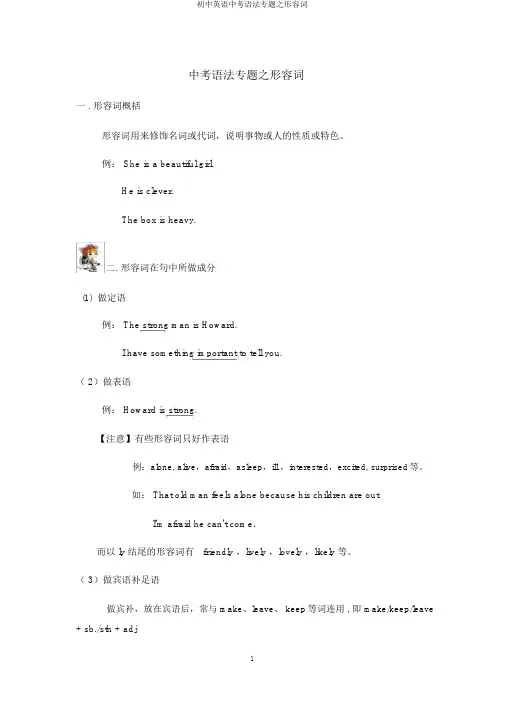
中考语法专题之形容词一 . 形容词概括形容词用来修饰名词或代词,说明事物或人的性质或特色。
例: She is a beautiful girl.He is clever.The box is heavy.二.形容词在句中所做成分(1)做定语例: The strong man is Howard.I have something important to tell you.( 2)做表语例: Howard is strong.【注意】有些形容词只好作表语例:alone, alive,afraid,asleep,ill ,interested,excited, surprised等。
如: That old man feels alone because his children are out.I'm afraid he can't come.而以 ly 结尾的形容词有friendly ,lively ,lovely ,likely 等。
( 3)做宾语补足语做宾补,放在宾语后,常与 make、leave、 keep等词连用 , 即 make/keep/leave + sb./sth + adj例: Howard keeps himself strong.三、形容词与其余词类的地点关系(1) 形容词修饰 something, anything, nothing, everything等不定代词时,形容词放在名词后。
[根源 :例: I have something important to tell you.Is there anything interesting in the film.Can you find anywhere quiet?He has been sent to somewhere particular.Did you see anybody else? 你还看到他人了吗 ?四、某些形容词能够和定冠词连用,表示一类人或事物,其作用相当于一个名词,如: the young(年青人),the poor (穷人),the rich (富人)。

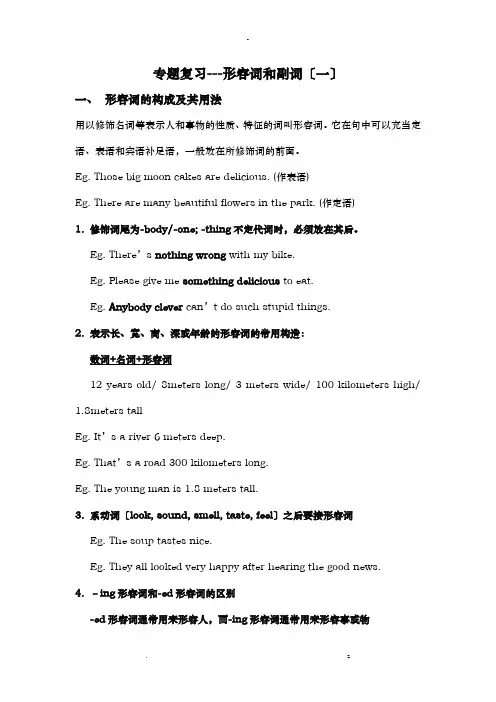
专题复习---形容词和副词〔一〕一、形容词的构成及其用法用以修饰名词等表示人和事物的性质、特征的词叫形容词。
它在句中可以充当定语、表语和宾语补足语,一般放在所修饰词的前面。
Eg. Those big moon cakes are delicious. (作表语)Eg. There are many beautiful flowers in the park. (作定语)1.修饰词尾为-body/-one; -thing不定代词时,必须放在其后。
Eg. There’s nothing wrong with my bike.Eg. Please give me something delicious to eat.Eg. Anybody clever can’t do such stupid things.2.表示长、宽、高、深或年龄的形容词的常用构造:数词+名词+形容词12 years old/ 8meters long/ 3 meters wide/ 100 kilometers high/ 1.8meters tallEg. It’s a river 6 meters deep.Eg. That’s a road 300 kilometers long.Eg. The young man is 1.8 meters tall.3.系动词〔look, sound, smell, taste, feel〕之后要接形容词Eg. The soup tastes nice.Eg. They all looked very happy after hearing the good news.4.–ing形容词和-ed形容词的区别-ed形容词通常用来形容人,而-ing形容词通常用来形容事或物如:disappointed/e*cited/interested/surprised/bored/amazed/rela*ed (*人)感到失望/兴奋/有趣/奇怪/厌烦/震惊/放松disappointing/e*citing/interesting/surprising/boring/amazing /rela*ing〔*事〕令人失望的/兴奋的/有趣的/奇怪的/厌烦的/震惊的/放松的5.“the +局部形容词〞表示“一类人〞the young the old the rich the poor二、副词的构成和用法。
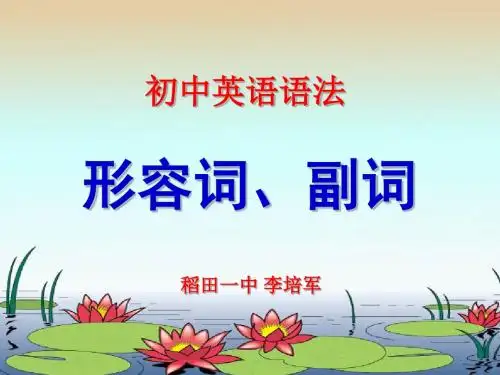
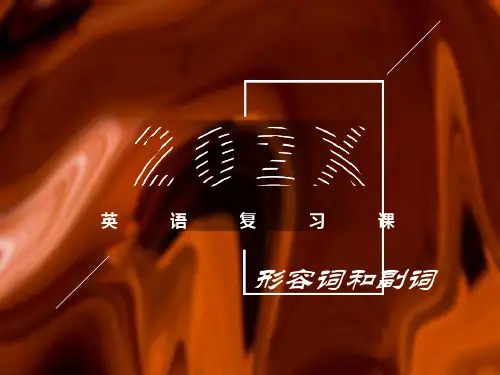

初中常考形容词形容词含义例句able有能⼒的She is able to solve this difficult math problem.(她有能⼒解决这道数学难题。
)afraid担⼼的;害怕的I'm afraid of the dark.(我怕⿊。
)alone单独的He likes to stay alone in his room.(他喜欢独⾃待在房间⾥。
)all所有的;全部的All the students in our class are hardworking.(我们班所有的学⽣都很努⼒。
)angry⽣⽓的;愤怒的My father was angry with me because I failed the exam.(我⽗亲因为我考试不及格⽽⽣我的⽓。
)another另⼀;再⼀Can you give me another example?(你能再给我举个例⼦吗?)any⼀些;任何的Do you have any questions?(你有任何问题吗?)bad坏的;严重的The weather is bad today.(今天天⽓不好。
)beautiful美丽的She is a beautiful girl.(她是个美丽的⼥孩。
)big⼤的There is a big tree in front of our school.(我们学校前⾯有⼀棵⼤树。
)bright明亮的;聪明的The room is very bright with many lights.(房间⾥有很多灯,⾮常明亮。
)busy忙的;忙碌的My mother is very busy every day.(我妈妈每天都很忙。
)careful⼩⼼的;仔细的Be careful when you cross the road.(过马路时要⼩⼼。
)cheap便宜的This shirt is very cheap.(这件衬衫很便宜。
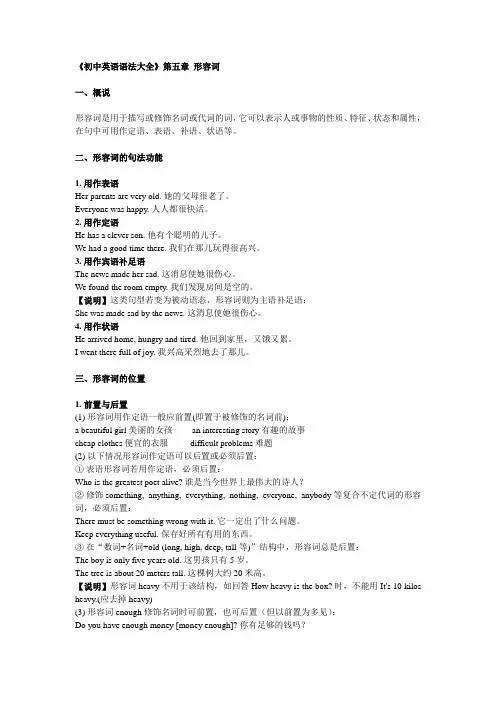
《初中英语语法大全》第五章形容词一、概说形容词是用于描写或修饰名词或代词的词,它可以表示人或事物的性质、特征、状态和属性,在句中可用作定语、表语、补语、状语等。
二、形容词的句法功能1. 用作表语Her parents are very old. 她的父母很老了。
Everyone was happy. 人人都很快活。
2. 用作定语He has a clever son. 他有个聪明的儿子。
We had a good time there. 我们在那儿玩得很高兴。
3. 用作宾语补足语The news made her sad. 这消息使她很伤心。
We found the room empty. 我们发现房间是空的。
【说明】这类句型若变为被动语态,形容词则为主语补足语:She was made sad by the news. 这消息使她很伤心。
4. 用作状语He arrived home, hungry and tired. 他回到家里,又饿又累。
I went there full of joy. 我兴高采烈地去了那儿。
三、形容词的位置1. 前置与后置(1) 形容词用作定语一般应前置(即置于被修饰的名词前):a beautiful girl 美丽的女孩 an interesting story 有趣的故事cheap clothes 便宜的衣服 difficult problems 难题(2) 以下情况形容词作定语可以后置或必须后置:①表语形容词若用作定语,必须后置:Who is the greatest poet alive? 谁是当今世界上最伟大的诗人?②修饰something, anything, everything, nothing, everyone, anybody 等复合不定代词的形容词,必须后置:There must be something wrong with it. 它一定出了什么问题。
初中英语语法专项习题-形容词1( )1. This box is___ that one.A. heavy thanB. so heavy thanC. heavier asD. as heavy as( )2 When we speak to people, we should be .A. as polite as possibleB. as polite as possiblyC. as politely as possibleD. as politely as possibly( )3 This book is____ that one, but____ than that one.A. as difficult as; expensiveB. as more difficult as; more expensiveC. as difficult as; more expensiveD. more difficult as; as expensive( )4 I think the story is not so ___ as that one.A. interestingB. interestedC. more interestingD. most interesting( )5 His father began to work____ he was seven years old.A. as old asB. as early asC. sinceD. while2( )1. I think science is _ than Japanese.A. much importantB. importantC. much more importantD. more much important( ) 2 This pencil is___ than that one.A. longestB. longC. longerD. as long( ) 3 My mother is no ___ young.A. shorterB. longerC. littleD. few( ) 4 These children are ____ this year than they were last year.A. more tallB. more tallerC. very tallerD. much taller( ) 5 It was very hot yesterday, but it is___ today.A. even hotterB. more hotterC. much more hotD. much hot( )6. Mrs Black has got____ instead of getting any better.A. more badB. a little worseC. much badlyD. a lot of worse3( ) 1 When we arrived, we found the meeting room crowded with___ students.A. quite a fewB. only a fewC. fewD. a few quite( )2 The house is small for a family of six.A. much tooB. too muchC. very muchD.so( )3 Through the window we can see nothing but ____ buildings.A. tall very manyB. very many tallC. very tall manyD. many very tall ( )4 -What's your brother like?-He is___.A. a driverB. very tallC. my friendD. at school( )5 The jacket was so___ that he decided to buy it.A. muchB. littleC. expensiveD. cheapl( )6 Our classroom is____ larger than theirs.A. moreB. quiteC. veryD. much4( ) 1 The earth is about____ as the moon.A. as fifty time bigB. fifty times as bigC. as big fifty timesD. fifty as times big( ) 2 Your room is mine.A. twice as large thanB. twice the size ofC. bigger twice thanD. as twice large as( ) 3 Your room is ___ than mine.A. three time bigB. three times bigC. three times biggerD. bigger three times ( ) 4 His father is____than his mother.A. older four yearsB. as four years olderC. four years olderD. bigger four years5( ) 1 Maths is more popular than____.A. any other subjectB. all the subjectsC. any subjectD. other subject( ) 2 China is larger than ____ in Africa.A. any other countryB. other countriesC. the other countryD. any country ( ) 3 Tom is stronger than ___ in his class.A. any other boyB. any boysC. any boyD. other boy6( ) 1 When spring comes, it gets____.A. warm and warmB. colder and colderC. warmer and warmerD. shorter and shorter( )2 By and by, ____ students in our class came to like English.A. more and moreB. much and muchC. many and manyD. less and least ( )3 At last he began to cry ___.A. hard and hardB. more hard and more hardC. harder and harderD. less hard and less harder( )4 When spring comes the days get ____ and nights ____.A. short; longB. long; shortC. longer; shorterD. shorter; longer71___ I look at the picture, ____ I like it.A. The best; the moreB. The more; the lessC. The more; lessD. More; the more2 ___ he read the book, ____ he got in it.A. The more; the more interestingB. The less; the more interestingC. The more; the more interestedD. More; more interested3 ___ you come back, _____ it will be.A, The quicker; the best B. The sooner; the betterC. Faster; the betterD. The sooner; better8( )1 I like___ one of the two books.A. the olderB. oldestC. the oldestD. older( )2 Which is___country, China or Japan?A. the largeB. the largerC. largerD. largest( ) 3 Of the two cups, he bought .A. the smallerB. the smallestC. small D: smaller9( ) 1 Which do you like ___, tea or coffee?A. wellB. betterC. bestD. most( ) 2 This work is ____ for me than for you.A. difficultB. most difficultC. much difficultD. more difficult( ) 3 Which do you think tastes ____, the chicken or the fish?A. goodB. betterC. bestD. well( ) 4 The Great Pyramid is about 137 metres high today, but it was once A. higher B. highest C. high too D. more high( ) 5 Don't you think it ______ not to write the letter?A. wellB. betterC. bestD. good10( ) 1 Who jumped____of all?A. farB. fartherC. farthestD. the most far( ) 2 Li Lei is___ student in our class.A. tallB. tallerC. tallestD. the tallest( ) 3 The fifth orange is____ of all. Give it to that small child.A. bigB. biggerC. the biggerD. the biggest( )4 Who is---of you three?A. the oldestB. much olderC. oldestD. older11( ) 1 Tom is one of ____ boys in our class.A. tallestB. tallerC. the tallest B. the tall( ) 2 English is one of____ spoken in the world.A. the important languagesB. the most important languagesC. most important languageD. the most important language( ) 3 Beijing is one of____ in China.A. the largest cityB. the large citiesC. the larger citiesD. the largest cities12( )1. Most of the woods ____ been taken good care of.A. areB. isC. hasD. have( )2 ___ like playing football and watching TV.A. Most boysB. Most of theyC. Most boyD. More of they( )3 ___ are here watering the flowers here.A. SomeB. Some of the boysC. Some boyD. Some of boys( )4 ___ haven't been to American.A. Most themB. Most theyC. More of themD. Most of them13( )1 ___ is more beautiful than roses.A. No other flowerB. No another flowerC. Not other flowerD. Not all flowers( )2 The tree is ___ in the garden.A. the tallerB. the tallestC. taller than of-allD. tall.( )3 Mary studies harder in her class.A. as any oneB. than any other girlC. than the otherD. than anyone14( )1 Which is___, Li Lei or Wu Tong?A. strongB. strongestC. strongerD. the strongest( )2 Which language is____, English, French or Japanese?A. easyB. the most easyC. the easiest oD. much more easy( )3 Which is____interesting, science, maths or English?A. moreB. the mostC. veryD. too( )4 Which city is____, Beijing, Shanghai or Fuzhou?A. beautifulB. more beautifulC. much more beautifulD. the most beautiful ( )5 Which month is____, June, July or August?A.hotB. hotterC. hottestD. the hottest15( )1 Do you have ____ to tell us?A. something newB. new somethingC. anything newD. new anything ( )2 Mike, I have____to tell you.A. important somethingB. important anythingC. something important ,D. anything important( )3 There is ___ in today's newspaper.A. interesting somethingB. nothing interestingC. interesting anythingD. anything interesting( )4 -Is Mrs Brown badly ill?-No, ____. Only a little cold.A. quite wellB. nothing seriousC. not worryD. anything serious( )5 Come here, I have____ to tell you.A. interesting somethingB. anything interestingC. nothing interestingD. something interesting16( ) 1. I'm not ___ to lift the heavy box.A. short enoughB. enough tallC. health enoughD. strong enough( ) 2 The girl works hard ___ to pass the exam.A. enoughB. tooC. stillD. yet( ) 3 He has____ to think it over.A. many timeB. timesC. time enough D, enough time17( ) 1 "Do you want____?" the shop assistant asked.A. else anythingB. anything elseC. other anythingD. else something ( ) 2 Have you seen ___ in the room?A. anyone elseB. else anyoneC. anyone otherD. everyone else( ) 3 ___ would like to go to the park with me?A. Whom elseB. What elseC. Who elseD. Else who18( ) 1 Wei Fang is only six, but she speaks English____ her mother.A. as good asB. as better asC. as well asD. as best as( ) 2 She was sick yesterday, but she is____ to go to school today.A. enough goodB. good enoughC. enough wellD. well enough( ) 3 This kind of book is______ for the children to read.A. enough well 'B. enough goodC. well enoughD. good enough( ) 4 -Are you feeling ____?-Yes, I'm fine now.A. quite goodB. quite betterC. any wellD. any better( ) 5 This shirt is no good. That one is evenA. betterB. worseC. wellD. worst19( ) 1 We have never seen___ interesting films.A. suchB. such anC. soD. such a( ) 2 Don't read books ___ you can't understand.A. as; suchB. such; asC. same; asD. as; as( ) 3 This is____ book___ I'd like to read once more.A. such an interesting; thatB. so interesting; thatC. such an interesting; asD. a so interesting; as( ) 4 We haven't seen ____ play.A. so wonderfulB. a so wonderfulC. such wonderfulD. such a wonderful 20( ) 1 I am twelve; Mike is fourteen; Mary is thirteen.So Mike is the ___ of the three.A. oldB. olderC. oldestD. the oldest( ) 2 My ____ brother is three years ____ than I.A. elder; elderB. older; oldestC. elder; olderD. older; elder( ) 3 His ____ son often go to see him on Sunday.A. eldestB. olderC. the eldestD. the older( ) 4 He is two years ___ than I.A. elderB. smallerC. youngerD. less21( ) 1 I think the book is very____.A. interestingB. interestedC. interestD. interests( ) 2 They were very ____ to see each other again.A. pleasedB. surprisingC. happilyD. angrily( ) 3 She is very____ the news.A. surprise inB. surprise withC. surprised atD. surprised for( ) 4 The boys are ___ computers.A. interesting inB. interestedC. interesting aboutD. interested about ( ) 5 -How does Kate like her new work? -She____ with the hours.A. can't satisfyB. isn't satisfiedC. doesn't satisfy D- hasn't satisfied ( ) 6 The man was not ___ when he heard the ___ words.A. frightening; frighteningB. frightened; frightenedC. frightening; frightenedD. frightened; frightening22( ) 1 Helen isn't a____ friend of mine. I feel___ sorry for her. A. true; true B. truly; true C. true; truly D. truly" truly( ) 2 I'm sorry. I'm late. My watch is a few minutes____.A. slowerB. slowlyC. more slowlyD. slow( ) 3 The song sounds___.A. sweetB. nicelyC. wellD. moved( ) 4 The ship sank____ under the sea.A. deeplyB. depthC. deepD. more deep23( ) 1 ___ helped a lot in our country.A. The blind isB. The blind areC. The blinds isD. Blind are ( ) 2 ___ should study hard for their work.A. YoungB. The young manC. The youngD. The young girl ( ) 3 ___ a happy life in China.A. The old man liveB. The old liveC. The old is livingD. Old live 24( ) 1 I don't feel very .A. terriblyB. wellC. goodD. badly( ) 2 Looking___ at his mother, the little boy looked____.A. happy; goodB. happy; wellC. sadly; sadD. sad; sadly( ) 3 Mother doesn't feel ___ today.A. goodB. wellC. niceD. health( ) 4 In summer eggs will go___ easily.A. terriblyB. terribleC. badlyD. bad( ) 5 Jim does morning exercises every day, so he looks very ___.A. tiredB. goodC. wellD. happy25( ) 1 The___ boy was taken to the nearest hospital.A. illB. sickC. goodD. clever( ) 2 We are___ of the work.A. illB. sickC. fullD. filled3 He has not been at school, because he is___.A. illB. wellC. fineD. nice26( ) 1 At last it made them___.A. happilyB. quicklyC. friendlyD. slowly( ) 2 We had a____ meal yesterday evening.A. livelyB. likelyC. lovelyD. love( ) 3 It is raining hard. He is____ to be late.A. lovelyB. likely'C. livelyD. friendly27( ) 1. I This book is very good. It___ buying.A. worthsB. is worthC. worthD. is worthing( ) 2 The film is very interesting. It is worth ____ a second time. A. seeing B. see C. to see D. seen( ) 3 Hike___, but 1 dislike ___.A. skating; swimB. skate; swimmingC. to skate; skateD. skating; swimming28( ) 1 I have worked on the problem, so I am feeling tired and___.A. asleepB. sleepyC. sleepingD. sleep( ) 2 He lay on the floor and fell ___.A. sleepyB. sleepingC. awakeD. asleep( ) 3 Who is ____ in the next room?A. asleepB. sleepC. sleepingD. sleepy29( ) 1 We have___time to do it better.A. notB. noC. no aD. not a( ) 2 We have ____ water to wash clothes.A. not anyB. no aC. not aD. no any( ) 3 I only want to say that I am____ fool.A. not anyB. no aC. not aD. no any30( ) 1 Mary's mother bought a____ coat for her yesterday.A. new big blue silkB. new blue silk bigC. new silk blue bigD. blue silk new big ( ) 2 My hometown has____bridge.A. a stone old fineB. an old stone fineC. a fine old stoneD. an old fine stone31( ) 1 That's really silly .A. of you to say soB. for you to say soC. of you saying soD. for you saying so ( ) 2 It's important ___ exercise every morning.A. of you to takeB. for you to takeC. of you takingD. for you taking初中英语语法专项习题-形容词参考答案:1. 1-5 D A C A B2. 1-6 C C B D A B3. 1-6 A A D B D D4. 1-4 B B C C5. 1-3 A D A6. 1-4 D A C C7. 1-3 B C B8. 1-3 A B A9. 1-5 B D B A B10. 1-6 C D C D D A 11. 1-3 C B D 12. 1-4 C A B D 13. 1-3 A B B 14. 1-5 C C B D D 15. 1-5 C C B B D 16. 1-3 D A D1 18. 1-5 C D D D B17. 1-3 B A C19. 1-4 A B A D20. 1-4 C C A C21. 1-6 A A C B B D22. 1-4 C D A C23. 1-3 B C B24. 1-5 B C B B C25. 1-3 B A A 26. 1-3 C C B27. 1-3 B A D28. 1-3 B D C29. 1-3 B D C30. 1-2 A C31. 1-2 A B。
新人教版七年级全册英语形容词表(含音标)以下是新人教版七年级全册英语课本中常用的形容词表,附带相应的音标。
Unit 1- tall /tɔːl/ 高的- short /ʃɔːrt/ 矮的- big /bɪɡ/ 大的- small /smɔːl/ 小的- long /lɔːŋ/ 长的- short /ʃɔːrt/ 短的- old /əʊld/ 老的- young /jʌŋ/ 年轻的- fast /fɑːst/ 快的- slow /sləʊ/ 慢的Unit 2- heavy /ˈhɛvi/ 重的- light /laɪt/ 轻的- thin /θɪn/ 瘦的- fat /fæt/ 胖的- strong /strɔːŋ/ 强壮的Unit 3- hot /hɒt/ 热的- cold /kəʊld/ 冷的- cool /kuːl/ 凉爽的- warm /wɔːrm/ 温暖的Unit 4- beautiful /ˈbjuːtəfəl/ 美丽的- handsome /ˈhæn.səm/ 帅气的- pretty /ˈprɪti/ 漂亮的- ugly /ˈʌɡ.li/ 丑陋的- cute /kjuːt/ 可爱的- smart /smɑːrt/ 聪明的- clever /ˈklɛvər/ 聪明的- kind /kaɪnd/ 友善的- mean /miːn/ 刻薄的- friendly /ˈfrɛnd.li/ 友好的Unit 5- clean /kliːn/ 干净的- dirty /ˈdɜːr.ti/ 脏的- tidy /ˈtaɪ.di/ 整洁的- messy /ˈmɛ.si/ 凌乱的Unit 6- happy /ˈhæp.i/ 开心的- sad /sæd/ 伤心的- excited /ɪkˈsaɪ.tɪd/ 兴奋的- bored /bɔːrd/ 无聊的- tired /ˈtaɪəd/ 疲劳的- energetic /ˌenərˈdʒetɪk/ 充满活力的Unit 7- noisy /ˈnɔɪ.zi/ 吵闹的- quiet /ˈkwaɪ.ət/ 安静的- busy /ˈbɪzi/ 忙碌的- relaxed /rɪˈlækst/ 放松的这是新人教版七年级全册英语课本中最常见的形容词。
第一部分词类语法形容词/副词(Adjective/Adverb)Lookerson see more than players. 当局者迷,旁观者清必知考点1:形容词/副词的构成◇G构成常见的形容词的构成①以[y]结尾:health + [y] →healthy 健康的greed + [y] →greedy 贪婪的②以[al], [ial]结尾:natur(e) + [al] →natural 自然的influent + [ial] →influential 有影响力的③以[ful], [less]结尾:success + [ful] →successful 成功的aim + [less] →aimless 无目标的④以[able]结尾:afford + [able] →affordable 可支持的reason + [able] →reasonable 有原因的⑤以[ive]结尾:product + [ive] →productive 有生产力的attract + [ive] →attractive 有吸引力的⑥以[ly]结尾:friend + [ly] →friendly 友好的live + [ly] →lively 生机勃勃的⑦以[ous], [ious]结尾:fam(e) + [ous] →famous 著名的spac(e) + [ious] →spacious 广大的⑧复合形容词:kind + hearted →kindhearted 心地善良的dark + blue →darkblue 暗蓝色的巧思:对[形容词后缀]的一些建议①不要特意去记,[后缀]只能辅助记忆,不能作为[背单词的手段]a. [形容词]中文翻译带有“的”字;b. 许多[形容词]都是由[差不多意思的其他词性]变换而来,因此背单词时只需要在原有单词含义基础上添加“的”字即可。
②[ful]结尾的形容词含义是:“充满……的”如:success n. 成功+ [ful] =充满成功的:successful③[able]结尾的形容词含义是:“能够……的”如:afford v. 支持+ [able] =可以支持的:affordable④[ive]结尾的形容词含义是:“有……性质的”如:act n. 行为+ [ive] =活力的:active⑤[less]是[否定形容词后缀]如:home n. 家+ [less] =无家可归的:homeless副词的构成①[形容词] + [ly]构成副词:happy →改y为i + [ly] →happily 高兴地careful + [ly] →carefully 认真地②天生就是[副词]:hard adv. 努力地alone adv. 孤独地巧思:不要被[ly]迷惑不是所有的以[ly]结尾的单词都是[副词]a. [adj.] + [ly] →[adv.]successful + [ly] →successfully adv. 成功地b. [v.], [n.] + [ly] →[adj.]like + [ly] →likely adj. 有可能的必知考点2:形容词变副词的细则形容词变副词细则①一般在[形容词]末尾加[ly]quick + [ly] →quickly slow + [ly] →slowly②以[辅音字母加y结尾]的[形容词],把[y]变成[i]再加[ly]happy →变[y]为[i] + [ly] →happily angry →变[y]为[i] + [ly] →angrily③少数以[e]结尾的[形容词],需要去掉[e]再加[y]或[ly]true →去掉[e] + [ly] →truly fortable →去掉[e] + [y] →fortably④有些以[ble], [ple]或[tle]结尾的[形容词],要去掉[e]再加[y]simple →去掉[e] + [y] →simply gentle →去掉[e] + [y] →gentlyterrible →去掉[e] + [y] →terribly⑤以[l]结尾的[形容词]在词尾加[ly],以[ll]结尾的[形容词]在词尾加[y]usual + [ly] →usually full + [y] →fully必考考点1:形容词与副词的用法及位置◇W位置形容词的位置①多数情况下,[形容词]作[前置定语]·Nice and warm days are ing.好且温暖的日子来临了。
初中英语形容词用法总结1. 功能定语:a beautiful girl表语:She is beautiful.宾补:I will make you happy.I found it interesting. (make / find / leave / keep)2. 位置a. 放在名词前a pretty girlb. 不定代词后:something different定语 c. else放在疑问代词后:what elsed. 较长后置:a swimming pool / ten metres long意义相反:All the people, young and old, are fond of music.e. 多个形容词排序:限定词/ 描绘性形容词/ 大小/ 形状/ 年龄/ 颜色/ 国籍/ 材料☆the + 形(代表复数)例:The poor are losing hope.3. 比较级别形容词比较等级的规则变化表☆用原级/比较级表最高级例:Beijing is the largest city in China.Beijing is larger than any other city.No other city is as large as China.副词adv和形容词一样,副词在句中也属于修饰范畴。
形容词主要修饰名词,而副词则主要用于修饰动词、形容词、其他副词以及全句,以表示程度、方式、时间、地点以及对话语的态度等。
例如:①.修饰动词的词语就是副词,如beat it heavily中的“heavily”就是副词,修饰“beat”,狠狠地打击。
②.还有的副词是修饰形容词的,常常表示程度。
如extremely beautiful中的“extremely”修饰形容词“beautiful”,“极其漂亮的”③.还有的副词本身修饰副词,和修饰形容词类似。
He plays football very well.④.较特殊情况的副词可以放在句首,表一种伴随状态。
最完整的初中英语语法大全英语语法大全初中英语语法学习提纲一词类句子成分和构词法1词类英语词类分十种名词形容词代词数词冠词动词副词介词连词感叹词1名词 n 表示人事物地点或抽象概念的名称如boy morning bag ball class orange2代词 pron who she you it3形容词 adj 表示人或事物的性质或特征如good right white orange 4数词 num 表示数目或事物的顺序如one two three first second third fourth5动词 v 表示动作或状态如am isarehavesee6副词 adv 修饰动词形容词或其他副词说明时间地点程度等如now very here often quietly slowly7冠词 art 用在名词前帮助说明名词如a an the8介词 prep 表示它后面的名词或代词与其他句子成分的关系如in on from above behind9连词 conj 用来连接词短语或句子如and but before10感叹词 interj 表示喜怒哀乐等感情如oh well hi hello2句子成分英语句子成分分为七种主语谓语宾语定语状语表语宾语补足语1主语是句子所要说的人或事物回答是谁或者什么通常用名词或代词担任如Im Miss Green 我是格林小姐2谓语动词说明主语的动作或状态回答做什么主要由动词担任如Jack cleans the room every day 杰克每天打扫房间3表语在系动词之后说明主语的身份或特征回答是什么或者怎么样通常由名词代词或形容词担任如My name is Ping ping 我的名字叫萍萍4宾语表示及物动词的对象或结果回答做的是什么通常由名词或代词担任如He can spell the word 他能拼这个词有些及物动词带有两个宾语一个指物一个指人指物的叫直接宾语指人的叫间接宾语间接宾语一般放在直接宾语的前面如He wrote me a letter 他给我写了一封信有时可把介词to或for加在间接宾语前构成短语放在直接宾语后面来强调间接宾语如He wrote a letter to me 他给我写了一封信5定语修饰名词或代词通常由形容词代词数词等担任如Shanghai is a big city ##是个大城市6状语用来修饰动词形容词副词通常由副词担任如He works hard 他工作努力7宾语补足语用来说明宾语怎么样或干什么通常由形容词或动词充当如They usually keep their classroom clean 他们通常让教室保持清洁 He often helps me do my lessons 他常常帮我做功课 The teacher wanted me to learn French all by myself 老师要我自学法语☆同位语通常紧跟在名词代词后面进一步说明它的情况如Where is yourclassmate Tom 你的同学汤姆在哪里3构词法英语构词法主要有合成法派生法和转换法1合成法如spaceship headache basketball playground等等2派生法1 派生名词①动词eror ②动词ing ③动词 t ion ④形容词ness ⑤其他如inventor learner swimming congratulation kindness carelessness knowledge2 派生形容词①名词y ②名词ful ③动词inged ④friendly ⑤dangerous ⑥Chinese Japanese ⑦English ⑧French ⑨German ⑩国名 i an 如snowy sunny hopeful beautiful interesting follwing daily 每日的nervous delicious3 派生副词①形容词ly ②其它如slowly angrily full→fully good→well possible→possibly等等3转换法1 形容词→动词如dry 干燥的→dry 弄干 clean 干净的→clean 打扫弄干净等等2 动词→名词如look walk rest work study swim go talk等等3 名词→动词如hand 手→传递 face 脸→面对等等4 形容词→副词如early→early fast→fast等等5 副词→连词如when 什么时候→当时候等等6 介词→副词如in 到里→在里面在家 on 在上→进行继续等等二名词1英语名词可分专有名词和普通名词两大类1专有名词是个别的人地物团体机构等的专用名称专有名词中实词的第一个字母要大写如Beijing Tom the Peoples Republic of China 中华人民共和国专有名词如果是含有普通名词的短语那么必须使用定冠词the如the Great Wall 长城姓氏名如果采用复数形式那么表示该姓氏一家人复数含义如the Greens 格林一家人2普通名词是许多人或事物的共有名称如pupil family man foot普通名词又分为可数名词和不可数名词▲可数名词是可以用简单的数词进行计数的名词如 box child orange▲不可数名词是不可以用简单的数词进行计数的名词如water news oil population information2英语可数名词的单复数英语可数名词有单数和复数两种形式1名词由单数变复数的基本方法如下①在单数名词词尾加s如map → mapsboy→ boyshorse→ horses table→tables②sox shch结尾的词加es如class→classes box→boxes hero→heroes dish→dishes bench→benches[注]少数以o结尾的词变复数时只加s如photo→photos piano→pianos③以辅音字母加y结尾的名词变y为i再加es如family→families city →cities party→parties④以f或fe结尾的名词变f或fe为v再加es如shelf→shelves wolf→wolves life→lives knife→knives2不规那么变化man→men woman→women sheep→sheeptooth→teeth fish →fish child→children ox→oxen goose→geese不可数名词一般没有复数形式说明其数量时要用有关计量名词如 a bag of rice→two bags of rice a piece of paper→three pieces of paper a bottle of milk→five bottles of milk3名词所有格名词所有格表示所属关系相当于物主代词在句中作定语宾语或主语其构成法如下1 表示人或其它有生命的东西的名词常在词尾加s如Childerns Day my sisters book 我姐姐的书2 以s或es结尾的复数名词只在词尾加如Teachers Day 教师节3 有些表示时间距离以及世界国家城镇等无生命的名词也可在词尾加s 如todays newspaper 今天的报纸 ten minutes break 十分钟的课间休息Chinas population 中国的人口4 无论表示有生命还是无生命的东西的名词一般均可用介词of短语来表示所有关系如a fine daughter of the Party 党的好女儿2[注解]① s还可以表示某人的家或者某个店铺如my aunts 我阿姨家 thedoctors 诊所②两人共有某物时可以采用 A and Bs 的形式如Lucy and Lilys bedroom 露西和丽丽合住的卧室③ of名词所有格名词性物主代词称为双重所有格如 a friend of my fathers 我父亲的一位朋友 a friend of mine 我的一位朋友4名词或代词作主语时和谓语之间的单复数的一致问题1谓语和谓语基本保持单复数的一致即主语是可数名词单数或不可数名词时谓语动词用单数形式如The computer was a great invention 计算机是个了不起的发明 The water in the glass is very cold 玻璃杯里的水很冷2集体名词如family class team group row police school等做句子主语时如果表示整体概念那么谓语用单数形式如Class Three is a very good class 三班是好班如果表示其中的所有成员时那么谓语用复数形式如Class Three have a map of China 三班有X中国地图3Chinese Japanese fish sheep people等表示单个时谓语用单数表示许多时谓语用复数如There is a sheep in the yard 院子里有只绵羊 There are some sheep in the yard 院子里有一些绵羊4maths news等虽然有s结尾但不是复数因此谓语仍用单数The news is very exciting 这个消息令人兴奋5glasses shoes socks trousers gloves等名词往往用复数形式故谓语用复数如The trousers are very cheap and I want to take them 裤子很便宜我想买6a lot of 后跟名词复数时谓语用复数形式跟不可数名词时谓语用单数形式如A lot of students are playing baseball now 现在有许多学生在打垒球A lot of time was wasted on that work 大量的时间花在了那个工作上被动句7and 连接两个名词做主语时谓语原那么上用复数但是两个名词若构成一个整体事物时谓语那么用单数如The teacher and his son are picking apples now 老师和他的儿子在摘苹果 Fish and chips is very famous food 鱼和薯条是一种出名的食品8 there be 句型中be的单复数一般由靠近的名词决定如There is a table and four chairs in the room 房间里有一X桌子和四X椅子9用bothand连接两个事物做主语时谓语一般用复数如Both you and I are required to be here tomorrow 你和我明天要求都来10主语中含有with的短语时谓语单复数由with之前的人物决定如A woman with a 7-year-old child was standing at the side of the road 一名妇女带着一个七岁的孩子当时就站在路边11eitheror或者 neithernor连接两个人物做句子主语时谓语采用就近原那么如Either you or he is right 要么是你对要么是他对你和他有一个人是对的 Neither you nor I am going there 你和我都不打算去那里12表示一段时间或长度概念的复数名词做主语时谓语一般用单数如Twomonths is not a short time 两个月不是个短时间 Two thousand kilometers is quite a long distance 距离两千千米是相当长的一段距离13主语中含有half of three quarters of all of the 等词语时谓语的单复数由名词确定如Over three quarters of the information on the Internet is in English 因特网上四分之三以上的信息是用英语写的 A third of the students were playing near the lake 学生的三分之一当时正在湖边玩耍 All of the water in these rivers has been polluted 这些河流中的水已经被污染了被动句但是population一词又有特殊情况 Whats the population of China 中国人口是多少句子用单数 Three quarters of the population in this city are Arabs 阿拉伯人这个城市四分之三的人口是阿拉伯人句子用复数5部分名词用法辨析1sportgamematchrace 的区别sport通常指户外运动以锻炼为主概念较大game意思是运动比赛不管户内户外还是脑力体力指以胜负为主的运动match意为竞赛比赛多指正式比赛race主要表示赛跑赛马赛车如People all around the world enjoy sports 全世界的人都喜爱运动 The 2008 Olympic Games will be held in Beijing 2008奥运会将在举行被动句 Our school football team won the league match 联赛我们学校足球队取得了联赛冠军 They were strong and won the boat race 汤他们很棒赢得了划艇比赛2festivalholidayvacation的区别festival节日指喜庆的日子或持续一段时间的文娱活动holiday 假日休息日指法定假日或风俗习惯复数可以表示一个较长的假期vacation假期指学习或工作中一段长时间的休息如TheShanghai Television Festival will be held next month ##电视节将在下个月举行 Sunday is a holiday and most people do not work 星期天是个假日多数人不工作What are you going to do during the summer vacationholidays 在暑期你打算做什么事情3journeytourtriptravel的区别journey指在陆地上或海上或空中进行的长途旅行不知终点含有辛苦的意思tour指途中作短期逗留的巡回旅行强调游览多处常用来指观光等trip通常指往返定时的短途旅行如出差度假等travel 多指长期或长途的观光旅行尤其指到国外没有明确目的地也作不可数名词指旅行这一行为如He made up his mind to make the journey to Dunhuang 他拿定主意要去敦煌旅行 He has gone on a walking tour 他步行观光去了 He took several trips to Shanghai last yeaar 去年他去了##好几次 Did you go to Santiago 圣地亚哥 during your travels 旅行期间你去圣地亚哥了吗Travelling through thick forests is dangerous 在密林里边穿行是很危险的 4soundnoisevoice的区别sound指各种声音noise主要指噪音voice指人的嗓音如The noise of the street kept me awake in the night 街上的喧嚣声让我彻夜难眠 All of a sudden there was the sound of shots and a cry 突然间传来几声枪响和一声尖叫 The singer has lost her ringing voice as a result of a bad cold 因为感冒的缘故这个歌唱家失去了她银铃般的嗓音5fish的问题指许多条鱼且不管种类时用fish单复数相同fishes 指许多种类的鱼fish指鱼肉时是不可数名词如There are many kinds of fishes in the pool 池子里有很多种类的鱼 I prefer fish to meat 与肉相比我更喜欢鱼三代词1代词的分类英语中代词分为人称代词物主代词反身代词指示代词关系代词疑问代词连接代词和不定代词等等2人称代词人称代词代替人和事物的名称分为主格和宾格两种形式第一人称单数第二人称单数第三人称单数第一人称复数第二人称复数第三人称复数阳性阴性中性主格 I我you 你he他she她it它we我们you你们they 他们她们它们宾格 me我you 你him他her她it她us我们you你们them 他们她们它们1主格用来作句子的主语表语如Ioften go shopping on Sundays 星期天我常去购物 Are they from Brazil 他们是巴西人吗 Where have they gone 他们上哪儿去了 Thats it 就那么回事 Its he 是他2宾格用来作及物动词或者介词的宾语如Who teaches you English this year 今年谁教你们的英语 Help me 救救我 We often write letters to her 我们常给他写信3人称代词作表语或者放在比较状语从句连词than或as之后时可以用主格形式也可以用宾格形式口语中大多用宾格如--Who is it 是谁–Its Ime 是我三个不同人称同时出现或者主语中包含我时按照you→he→I的顺序表达如Both he and I are working at that computer company 我和他都在那家电脑公司上班–Who will go there 谁要去那儿–You and me 你和我人称代词it除了可以指人指物之外还可以表示时间天气温度距离情况等含义此外还可以作非人称代词使用替代作主语或者宾语的不定式动名词或者名词性从句如--Whats the weather like today 今天天气怎样 Its fine 天气晴好--Whats the time 几点啦–Its 1200 Its a long way to go 那可要走好长的路 It took him three days to clean his house 打扫屋子花了他三天的时间 It is very clear that the public want to know when these men can go into space 很显然公众想知道这些人什么时候能进入太空 We found it very difficult to learn a foreign language well 我们发觉要学好一门外语是非常困难的3物主代词说明事物所属关系的代词分为形容词性和名词性两种第一人称单数第二人称单数第三人称单数第一人称复数第二人称复数第三人称复数阳性阴性中性形容词性my我的your你的his他的her她的its它的our我们的your你们的their 他们的她们的它们的名词性 mine我的Yours你的his他的hers她的its她的ours我们的yours你们的theirs 他们的她们的它们的1形容词性物主代词只能作句子中名词的修饰语后面要跟名词如Is that your umbrella 那是你的伞吗 I often go to see my aunt on Sundays 我经常在星期天去看望阿姨 They are their books 是他们的书2名词性物主代词相当于名词既代替事物又表明所属关系在句子中往往独立地作主语宾语或者表语后面千万不可以跟名词如This is your cupbut where is mine 这是你的杯子可我的在哪儿 Your classroom is very big but ours is rather small 你们的教室很大我们的相当小3of 名词性物主代词称为双重所有格作定语时放在名词的后面如A friend of mine came to see me yesterday 我的一个朋友昨天来看我了指若干朋友中有一个来看我[试比较] My friend came to see me yesterday 我的朋友昨天来看我了指我的那个特定的朋友来看我4反身代词表示谓语的动作与主语有关或者宾语补足语的动作与宾语有关第一人称单数第二人称单数第三人称单数第一人称复数第二人称复数第三人称复数阳性阴性中性myself我自己yourself你自己himself他自己herself她自己itself它自己ourselves我们自己yourselves你们自己themselves 他们她们它们自己1反身代词在句子中作宾语表示反射指一个动作回到该动作执行者本身如Dont play with the knife you might hurt yourself 不要玩刀子那会割伤你的2在句子中作同位语表示强调即用来强调名词或代词的语气如The story itself is good Only he didnt tell it well 故事本身是好的只是他没有讲好指示代词指示说明近处或者远处上文或者下文以前或者现在的人或事物单数复数含义this 这个these 这些指较近的人和物that 那个those 那些指较远的人和物such 这样的人物指上文提过的人和物same 同样的人物指和上文提过的相同的人和物it 这人这物指不太清楚是谁或者是什么时指示代词既可以单独使用做句子的主语宾语或表语也可以作定语修饰名词如Whats this 这是什么 That model plane is made of plastic 那只模型飞机是塑料做的被动句 Remember never to do such things 记得永远不要做这样的事情 Do the same as the teacher tells you 按老师说的做---Who is it 是谁 ---Its me 是我6关系代词用来引导定语从句的代词叫关系代词参见后面的定语从句1关系代词who which that whom 等将定语从句和主句连接起来英语中的关系代词一方面在从句中担任一定的成分另一方面又起连接作用如The student who is drawing a picture is in Grade One 正在画画的学生是一年级的2关系代词who whom指人如果作从句的宾语那么有时省略如Do you know the man who is wearing a red hat 你认识那个戴着红帽子的男人吗3关系代词which 指物如果作从句的宾语那么有时省略如Have you found the book which you lost several days ago 你找到几天前丢失的那本书了吗4关系代词that既可指人也可指物如果作从句的宾语那么有时省略如Can you see the mandog that is running along the river bank 你看得见顺着河跑的男人狗了吗7连接代词用来引导宾语从句主语从句或表语从句的连接词称连接代词英语中连接代词主要有what 什么 who 谁 whom 谁which 哪个whose 谁的详见相应从句8不定代词代替或修饰不特指的人或事物的代词叫不定代词单数含义someany nonone eachevery one eitherneither so the otheranother 复合不定代词不可数含义much littlea little all 复数含义many fewa few ones both othersthe others 注复合不定代词有12个something 某事 someone 某人 somebody 某人 anything任何事 anyone 任何人 anybody 任何人 nothing 没事 nobody 没有人 no one 没有人 everything 一切 everyone 每个人 everybody 每个人1 some和 any 的用法some一般用于肯定句中意思是几个一些某个作定语时可修饰可数名词或不可数名词如I have some work to do today 今天我有些事情要做 They will go there some day 他们有朝一日会去那儿some 用于疑问句时表示建议请求或希望得到肯定回答如Would you like some coffee with sugar 你要加糖的咖啡吗any 一般用于疑问句或否定句中意思是任何一些任何一个作定语时可修饰可数或不可数名词如They didnt have any friends here 他们在这里没有朋友 Have you got any questions to ask 你有问题要问吗any 用于肯定句时意思是任何的Come here with any friend 随便带什么朋友来吧2 no和none的用法no是形容词只能作定语表示意思是没有修饰可数名词单数或复数或不可数名词如There is no time left Please hurry up 没有时间了请快点 They had no reading books to lend 他们没有阅读用书可以出借none只能独立使用在句子中可作主语宾语和表语意思是没有一个人或事物表示复数或单数如None of them isare in the classroom 他们当中没有一个在教室里 I have many books but none is interesting 我有很多的书但没有一本是有趣的3 all和both的用法all指三者或三者以上的人或物用来代替或修饰可数名词也可用来代替或修饰不可数名词both指两个人或物用来代替或修饰可数名词all和both在句子中作主语宾语表语定语等如I know all of the four British students in their school 他们学校里四个英国学生我全认识 --Would you like this one or that one –Both 你要这个还是那个两个都要all和both既可以修饰名词 allboth the 名词也可以独立使用采用allboth of the 名词复数的形式其中的of 可以省略如All of the boys are naughty 是男孩都调皮4 every和each用法every是形容词只能作定语修饰单数名词意思是每一个表示整体概念each是形容词代词可用作主语宾语定语等意思是每个或者各个表示单个概念each可以放在名词前可以后跟of短语与动词同时出现时要放在be动词助动词情态动词之后或者行为动词之前every和each都用作单数理解但是下文中既可以用单数的代词如hehimhis 也可以用复数的代词如theythemtheir 替代如Every one of the students in his class studies very hard 他班上每个学生学习都很用功 They are very busy Each of them has something to do 他们很忙人人都有事干5 either和neither的用法either意思是两个中间的任何一个neither是either的否定形式意思是两个都不neither和either在句子中可作主语宾语和定语等都用作单数如I dont care much for what to drink Either of the two will do 我不介意喝些什么两个之中随便哪个都行 --Will you go there by bus or by car –NeitherI will go there by train 你坐公车去还是坐轿车去一个都不坐我坐火车去6 otherthe other和another的用法other意思是另一另一些有复数形式在句子中可作主语宾语和定语another 意思是另外又一个表示增加在句中可作宾语和定语如Some girls are singing under the big apple tree and others are sitting on the grass talking 有些女孩在大苹果树下唱歌别的就躺在草地上说话You have had several cakes Do you really want another one 你已经吃了好几块饼子了你真的还要一块 I want another four books 我还要四本书another 另外的再一又一与the other 另外的一个主要从数量上区分只有两个时用the other在原先基础上增加用another如 This is one of your socks Where is the other one 这是你的一只袜子还有一只呢 I have eaten 4 cakes but I still want another 我已经吃了4块蛋糕但是我还要以块others与the others的主要区别others指剩余的人物指大部分 the others指其余的人物指全部如 A few students are playing soccer while others are watching them 有几个学生在踢足球其他一些人在观看 Two of the ten boys are standing and the others are sitting round them 十个男孩中有两个站着其他人都围着他们坐着7 many和much的用法many意思是很多与可数名词复数连用much意思是很多与不可数名词连用它们在句中可作主语宾语和定语等如I dont have many friends here 在这里我没有很多的朋友 Many died in the bus accident 许多人在公交车祸中丧失We can learn much with the help of him 在他的帮助之下我们能学到很多 many和much一般用于否定句肯定句中通常用a lot of 或者lots of many much用于肯定句时可以在前面加上sovery或too如 There are a lot of people on the playground 操场上有许多的人 They havent got much work to do 他们没有多少事情可做 There are too many people in the room 房间里人太多了8 fewlittlea fewa little的用法fewlittle意思是很少几个几乎没有有否定的意思a fewa little意思是有几个有些有肯定的意思 fewa few与可数名词连用或代替可数的事物 littlea little与不可数名词连用或代替不可数的事物它们在句中可作主语宾语和定语如He is very poor and he has little money 他很穷几乎没有什么钱 Dont worry There is still a little time left 别着急还有一点儿时间呢 In that polar region there live few people 在那个极地地区几乎不住人 You can get a few sweets from him 你可以从他那儿弄到一些糖果9 复合不定代词somebody something anything nothing everything everybody等是由some any no every 加上body thing 构成的叫做复合不定代词在句子中当单数使用somebody something someone 一般用于肯定句中anything anybodyanyone 一般用于疑问句否定句和条件状语从句中修饰复合不定代词的定语应放在它们的后面如HeyLily There is someone outside the door 嗨丽丽门外有人 Di 每个人 d you meet anyone when you came to school last Sunday 上个星期天你来学校时见到什么人了吗 He has nothing much to do today 他今天没有多少事情做10 one与ones用来代替上文的一个或多个人或事物前面可以加冠词形容词指示代词which等如 Which jacket would you like this one or that one 你要哪件夹克这件还是那件 I dont like the green ones 我不喜欢绿色的那些11 so可以代替一件事情作句子的宾语或表语如 I dont think so 我认为不是这样的 He lost a book So did I 他丢失了一本书我也是12 a lot oflots ofa number of large numbers of a great deal ofplenty of的区别五个名词介词短语都表示大量许多a lot of 或lots of 既可以修饰不可数名词也可以修饰可数名词的复数形式可以相应地换为much和manyplenty of足够大量既可以修饰不可数名词也可以修饰可数名词的复数形式 a number of large numbers of只可以修饰可数名词复数形式它修饰的词作主语时谓语用复数形式可以换为somemanya lot ofplenty of a great deal of只可以修饰不可数名词它修饰的词作主语时谓语用单数形式可以换为much 如A lot of people think that time is money 许多的人认为时间就是金钱 I dont have to do it in a hurry because I have plenty of time 我用不着赶忙因为我有充足的时间 I have a number of letters to write today 今天我有好多信要写 I spend a great deal of timemoney on shopping 在购物方面我花费了大量的时间金钱13 noneno onenobody的区别no one和nobody都表示没有人仅指人后面不跟of 短语作主语时谓语用单数形式none表示没有一个人物可指人也可以指物后面可跟of短语作主语时谓语可用单数也可用复数如No one knows how he managed to get the ticket 没有人知道他是怎样搞到那X票的 Nobody handed in histheir composition s yesterday 昨天没有一个人交作文 None of my friends came to see me that day 那天没有一个朋友来看我9相互代词表示相互关系的词叫相互代词each other one another是相互代词译成互相可以通用each other表示两者之间而one anther表示许多人之间它们有所有格形式each others one anothers如 We must help each other when we are in trouble 我们身处困境时要互相帮助 They sat there without talking to one another each other 他们坐在那儿互相都不说话10疑问代词用来提出问题的代词称为疑问代词1whowhomwhosewhatwhichwhoeverwhateverwhichever主要用于特殊疑问句中一般放在句首口语中也常用who代替whom作宾语但在介词后那么只能用whom 如Who m did you invite to your birthday party 你都邀请了谁参加你的生日聚会的 What does she want to be when she grows up 她长大了想干什么2who 和whom只能独立使用其中who可以作句子的主语表语或动词的宾语whom只能作谓语动词的宾语而whatwhichwhose等既可以独立使用作主语表语和。
初中英语语法大全-5.形容词《初中英语语法大全》第五章形容词一、概说形容词是用于描写或修饰名词或代词的词,它可以表示人或事物的性质、特征、状态和属性,在句中可用作定语、表语、补语、状语等。
二、形容词的句法功能1. 用作表语Her parents are very old. 她的父母很老了。
Everyone was happy. 人人都很快活。
2. 用作定语He has a clever son. 他有个聪明的儿子。
We had a good time there. 我们在那儿玩得很高兴。
3. 用作宾语补足语The news made her sad. 这消息使她很伤心。
We found the room empty. 我们发现房间是空的。
【说明】这类句型若变为被动语态,形容词则为主语补足语:She was made sad by the news. 这消息使她很伤心。
4. 用作状语He arrived home, hungry and tired. 他回到家里,又饿又累。
I went there full of joy. 我兴高采烈地去了那儿。
三、形容词的位置1. 前置与后置(1) 形容词用作定语一般应前置(即置于被修饰的名词前):a beautiful girl 美丽的女孩 an interesting story 有趣的故事cheap clothes 便宜的衣服 difficult problems 难题(2) 以下情况形容词作定语可以后置或必须后置:①表语形容词若用作定语,必须后置:Who is the greatest poet alive? 谁是当今世界上最伟大的诗人?②修饰something, anything, everything, nothing, everyone, anybody 等复合不定代词的形容词,必须后置:There must be something wrong with it. 它一定出了什么问题。
初中英语语法专项练习二——形容词一选择正确的答案1.Which does Jimmy like _______, Chinese or art?A. wellB. bestC. betterD. much2. The Changjiang River is one of ______ in the world.A. the longest riverB. The moreC. the longest riversD. longer river3. ______ of the two women is Mrs Brown.A. The beautifulB. The more beautifulC. More beautifulD. The most beautiful4. My mooncake is nicer _______ his.A. likeB. withC. forD. than5. You are fatter than _______.A. heB. hisC. himD. he is tall6. He jumps _______ of the three.A. farB. futherC. farthestD. furthest7. My hair is longer than _______.A. my sisterB. KateC. my brother’sD.Lucys’8. There is ______ paper here. Please bring some.A. littleB. lessC. fewerD. a little9. The pen is ______ than that one.A. more cheapB. cheapC. much cheaperD. quite cheaper10. Tom speaks Chinese _______ better than Jimmy.A. moreB. veryC. a lotD. much11. There are _______ girls in Class 2 than in Class 4.A. moreB. nicestC. mostD. best12. It’s too ______ for you to do that.A. easyB. more dangerousC. harderD. the easist13. Who has ______ apples now, Jim, Lily or Lucy?A. muchB. biggestC. betterD. the most14. You have more rulers than me. But ______ are nicer than _______.A. mine, yoursB. mine, yourC. my, yoursD. my, your15. Tingting is ______ than Meimei,but Meimei is ______ than Tingting.A. tall, strongerB. taller, strongestC. tallest, strongD. taller, stronger16. Mother is _______ in my family.A. busyB. busierC. the busiestD. more busy17. There are _______ in the park on Sundays.A. more childrenB. a lot of peopleC. much men and womenD. many peoples18. The dumplings are _______ than the noodles, I think.A. more nicerB. much deliciousC. very niceD. much more delicious19. She is _______ than me at drawing.A. betterB. bestC. goodD. harder20. This blue sweater is too big for me. Will you please show me a ______ one?A. smallB. smallerC. the smallestD. smallest二.用所给词的适当形式填空1. Your classroom is _______ (wide) and _______ (bright) than ours.2. There are _______ hours of sunlight a day in winter than in summer. (few)3. Which do you like _______, maths or chemistry?(well)4. This is the ______ film I have ever seen. (good)5. Africa is the second _______ continent. (large)6. What he said made his mother much ______. (angry)7. I’m not as _______ as he. (careful)8. We’ve got as _______ books as we need.(many)9. They have done _______ (much) work with ______ (little) money.10. Practice as ______ as you can. (much)11. You’re the ______ person I’ve ever seen. (kind)12. He is _____ than his two sisters. (young)13. The ______ (old) I get, the ______ (strong) I seem to feel.14. The weather is getting ______ (warm) and ______ (warm).15. You are far ______ than you were. (polite)16. The patient is no ______ than people. (well)17. Summer is ______ season of the year. (hot)18. I can do it well with even ______ money. (little)三.中考真题测试1. The air in Beijing is getting much ______ now than a few years ago. (2005年北京)A. cleanB. cleanerC. cleanestD. the cleanest2. My cousin has changed a lot. She used to be ______ but now she is tall.A. shortB. thinC. prettyD.heavy3. Mobile phones are very popular now and they are ______ than before. (2005北京海淀)A. cheapB. cheaperC. cheapestD. the cheapest4. —We spent all our money because we stayed at the most expensive hotel in town. —Why didn’t you stay at _____ one?A. a cheapB. a cheaperC. the cheapD. the cheaper5. —Do you like western food?— No. The food of our country is ______ that of western countries. (2005年广州)A. rather good thanB. much better thanC. more better thanD. not so good as6. This is _____ that all of us believe it’s very important. (2005年广州)A. such useful informationB. so useful an informationC. so useful informationD. such a useful information7. — Mum, could I have an MP3— Certainly, we can buy _____ one, but as good as this. (2005年沈阳)A. a cheapB. a cheapestC. a cheaperD. the cheapest8. The harder we work, the ______ result we will get.(2005年大连)A. fasterB. fewerC. betterD. the cheapest9. We should keep our eyes ______ while doing eye exercises. (2005年吉林)A. closeB. closedC. openD. opened10. Look at the man in the right picture. He is ______. (2005年吉林)A. right-handedB. left-handedC. no handD. a hand11. — Tom is good at drawing. How about Mike?— Mike is ______, I think. He has got more prizes than Tom.(2005年河南)A. wellB. OKC. goodD. better12. — Have you bought that digital camera?— No, I can’t afford it. The price is a bit ______. (2005年河南)A. nowB. highC. cheap expensive13. Now more and more Chinese people are ______ enough to buy cars.A. richB. weakC. poorD. strong14. Kate is really ______. She’s never angry with others. (2005年安徽)A. tallB. friendlyC. luckyD. clever15. —Which is ______ river in China? (2005年武汉)— The Changjiang River.A. longerB. the longestC. longestD. the longer参考答案;一.1. C 2. C 3. A 4. D 5. C6. C 三个人或三人以上比较时,用形容词最高级,表示“最远”用farthest, 而further, furthest多表示抽象意思,“更进一步”等7. C8. A little, a little修饰不可数名词,little表示否定含义,意为“没多少” a little 表示肯定含义,意为“有一点儿”9. C 10. D11-15AADAD 16-20 CBDAB二.1. wider, brighter 2. fewer 3. better 4. best 5. largest 6. angrier 7. careful8. many9. more, less 10. much 11. kindest 12. younger 13. older, stronger 14. warmer, warmer 15. politer 16. better 17. the hottest 18. less三.1-5 BABBB 6-10 ACCBB 11-15 DBABB。